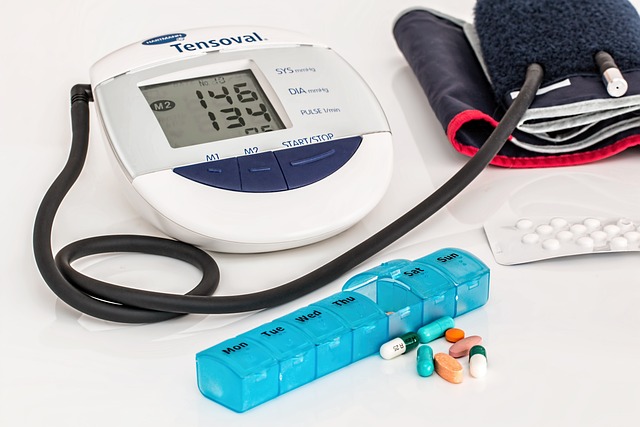Adopting a healthier lifestyle is achievable through simple, affordable changes. Key components include a balanced diet with diverse nutrient-dense foods, regular exercise (150 mins/week moderate or 75 mins vigorous), staying hydrated, effective stress management through mindfulness, quality sleep (7-9 hours), healthy meal planning, and portion control to avoid processed food high in added sugars and unhealthy fats.
Looking to prioritize your health without breaking the bank? This guide offers practical and affordable tips for a healthier lifestyle. From balanced diet advice like incorporating nutrient-dense foods and cost-effective meal prepping, to regular exercise routines you can do at home or in your neighborhood, we’ve got you covered. Learn how to staying hydrated tips using simple tricks, and discover effective stress management and quality sleep tips for optimal well-being. Say goodbye to expensive gym memberships and hello to a vibrant, balanced life!
- Balanced Diet Advice
- – Incorporate a variety of nutrient-dense foods
- – Focus on whole grains, lean proteins, and plenty of fruits & vegetables
- – Tips for meal prepping and budget-friendly grocery shopping
Balanced Diet Advice

Adopting a balanced diet is one of the most effective tips for a healthier lifestyle. It involves consuming a variety of foods from all food groups, including fruits, vegetables, whole grains, lean proteins, and healthy fats. Regular exercise routines complement this advice, helping to maintain a healthy weight, build strength, and boost cardiovascular health. Staying hydrated tips include drinking plenty of water throughout the day, which supports various bodily functions.
Additionally, effective stress management through mindfulness practices like meditation or deep breathing can significantly impact overall well-being. Quality sleep tips encourage prioritizing adequate rest, aiming for 7-9 hours nightly to ensure optimal recovery and cognitive function. Healthy meal planning involves preparing meals in advance, considering portion control strategies to avoid overeating. Lastly, avoiding processed food is crucial; opt for whole, unprocessed options whenever possible to minimize added sugars, unhealthy fats, and artificial additives.
– Incorporate a variety of nutrient-dense foods

Adopting a healthier lifestyle doesn’t have to be complicated or expensive. One simple yet effective strategy is to focus on your diet and ensure you’re getting a balanced diet advice. Aim to incorporate a variety of nutrient-dense foods from all food groups, including fruits, vegetables, whole grains, lean proteins, and healthy fats. This not only provides your body with essential vitamins and minerals but also supports overall well-being.
Incorporating regular exercise routines, staying hydrated tips, effective stress management, and practicing mindfulness can all contribute to a healthier you. Quality sleep tips are also crucial, as adequate rest is vital for physical and mental health. Plan your meals in advance using healthy meal planning and portion control strategies to avoid overeating or reaching for unhealthy snacks. Moreover, be mindful of your consumption of processed foods, which often contain high levels of sugar, salt, and unhealthy fats.
– Focus on whole grains, lean proteins, and plenty of fruits & vegetables

Adopting a balanced diet is one of the most effective tips for a healthier lifestyle. Focus on incorporating whole grains like brown rice, quinoa, and oats into your meals. These complex carbohydrates provide sustained energy and essential nutrients. Pair them with lean proteins such as chicken, fish, tofu, or legumes to ensure you’re getting all the necessary amino acids. Fill half your plate with a variety of fruits and vegetables to boost your vitamin and mineral intake. Dark leafy greens, berries, and citrus fruits are excellent choices.
Additionally, staying hydrated, engaging in regular exercise routines, and implementing effective stress management techniques like mindfulness practices are crucial. Make it a priority to drink plenty of water throughout the day. Incorporate at least 150 minutes of moderate-intensity aerobic activity or 75 minutes of vigorous activity each week. To improve sleep quality, aim for 7-9 hours nightly. Healthy meal planning and portion control strategies can help you make nutritious choices while avoiding processed foods high in added sugars and unhealthy fats.
– Tips for meal prepping and budget-friendly grocery shopping

Adopting a healthier lifestyle doesn’t have to be expensive. One effective strategy is to embrace healthy meal planning and budget-friendly grocery shopping. Start by setting aside a specific day each week for meal prepping, where you prepare and portion out your meals in advance. This not only saves time but also encourages adherence to balanced diet advice. Create a shopping list based on the recipes you’ve planned, sticking to whole foods and avoiding processed food to stay within budget.
Consider incorporating regular exercise routines and staying hydrated tips into your weekly planning. Look for affordable ways to stay active, like walking, jogging, or bodyweight exercises at home. Keep a water bottle with you throughout the day to ensure consistent hydration. Additionally, practice effective stress management and mindfulness practices such as meditation or deep breathing exercises to promote mental well-being. For better sleep, follow quality sleep tips, maintaining a regular sleep schedule and creating a relaxing bedtime routine.
Adopting a healthier lifestyle is not just about significant changes; it’s also about making sustainable choices. By incorporating balanced diet advice like diverse nutrient-dense foods, whole grains, and fruits & vegetables, along with regular exercise routines, staying hydrated tips, effective stress management techniques, mindfulness practices, quality sleep habits, healthy meal planning, portion control strategies, and avoiding processed food, you can gradually transform your well-being. These affordable ways to prioritize health not only benefit your physical state but also contribute to a happier, more fulfilling life.
